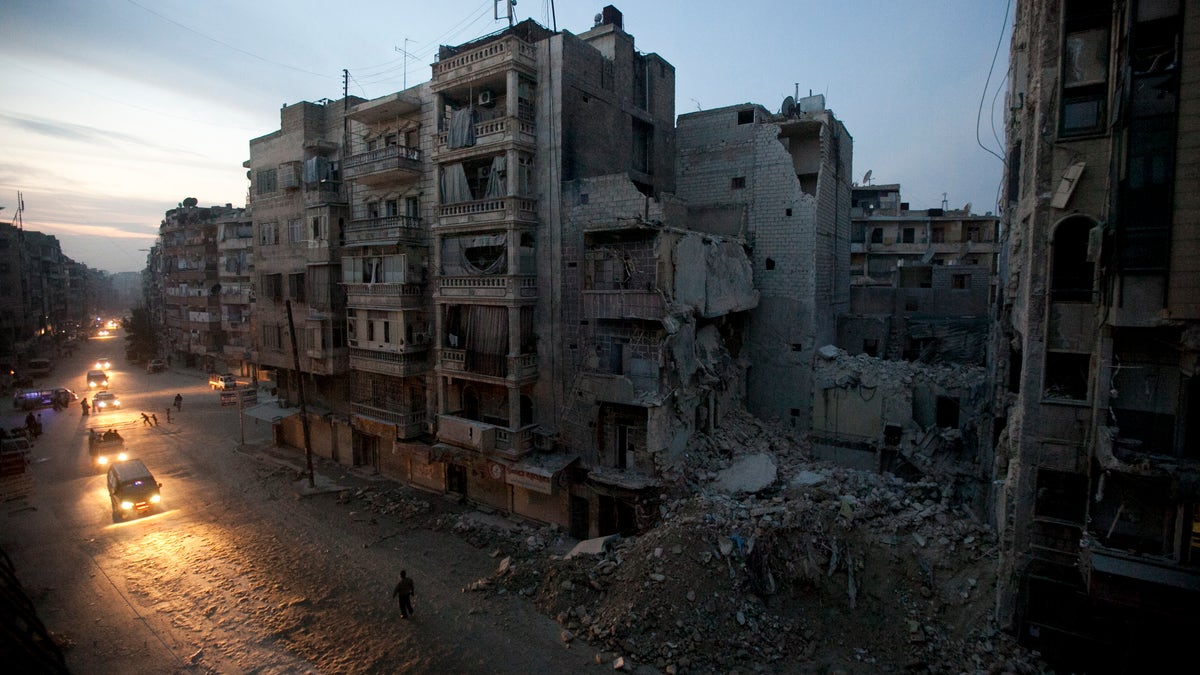Decade-long Syrian conflict continues to plague region
Fox News correspondent Greg Palkot has the latest on the civil war on 'Special Report'
A global chemical weapons watchdog group released the results of a nearly two-year-long investigation into the use of chemical weapons in Douma, Syria, in 2018, on Friday, concluding that Syrian government forces were behind the attack.
The Organization for the Prohibition of Chemical Weapons (OPCW) said it had "reasonable grounds" to believe "at least one" Syrian Tiger Forces Elite Unit helicopter "dropped two yellow cylinders containing toxic chlorine gas on two apartment buildings in a civilian-inhabited area."
The April 7 attack killed 43 people and wounded 500 more, most of whom were women and children.

A man stands on the rubble of damaged buildings after an airstrike on the rebel-held town of Mesraba in the eastern Damascus suburb of Ghouta, Syria, November 26, 2017. (REUTERS)
ISRAEL TO ‘EXPEDITE’ GUN LICENSES AFTER DEADLY SHOOTING NEAR JERUSALEM SYNAGOGUE
The OPCW Investigation and Identification Team (IIT) gathered evidence from witnesses, satellite images and authenticated videos and photographs to piece together the 139-page report.
It also relied on forensic analysis, gas dispersion modeling and roughly two terabytes of data to develop multiple scenarios as to how the attack could have occurred.
The watchdog agency said it considered the Syrian government and its Russian-backed allies' claims that opposition forces were behind the attack and that it had been "staged by terrorist armed groups," who used household bleach items or pesticides.
"The symptoms of the victims are, overall, consistent with exposure to chlorine gas in very high concentrations. Following the assessment and corroboration of the relevant material, the toxicologist consulted by the IIT reached the conclusion that the accounts of the victims and medical personnel were consistent with the rapid release of a high dosage of chlorine gas, which led to the rapid and high fatality rate," the report read.
"Information obtained by the IIT indicates that, in the timeframe in which the incident occurred, the airspace over Douma was exclusively controlled by the Syrian Arab Air Force and the Russian Aerospace Defense Forces. While the IIT assessed information showing that other States carried out airstrikes and operations on the territory of the Syrian Arab Republic in April 2018, it has not obtained any information suggesting that airstrikes were carried out in the eastern Ghouta area (including Douma) by forces opposing the authorities of the Syrian Arab Republic," the report continued.
Investigators say the attack was conducted as part of a major military offensive by Syrian government forces to retake the key rebel stronghold and return control to President Bashar al-Assad.
World leaders expressed horror and outrage over the chemical attack after images surfaced of civilians lying dead in their apartment buildings and foaming at the mouth. The 2018 attack prompted precision military strikes against government forces led by the United States, Britain and France.
French President Emmanuel Macron said the operation targeted the "clandestine chemical arsenal."
"We cannot tolerate the trivialization of chemical weapons, which is an immediate danger for the Syrian people and our collective security," Macron said.
Syria’s foreign ministry released a statement on Saturday denying the conclusions of the OPCW’s report, saying it "totally rejects" the "lack [of] scientific and objective evidence." Assad has repeatedly denied his forces were responsible for gassing civilians, instead blaming terrorists and opposition forces.
ASSAD REGIME MISSES KEY DEADLINE TO HAND OVER CHEMICAL WEAPONS
Eastern Ghouta, a predominantly Sunni Muslim agricultural city located roughly six miles from the capital Damascus, was the first city hit by chemical weapons in 2013.

Nov. 29, 2012: Night falls on a Syrian rebel-controlled area of Aleppo as destroyed buildings, including Dar Al-Shifa hospital, are seen on Sa'ar street after airstrikes targeted the area a week before. (AP)
The OPCW watchdog group said the sarin gas attack killed hundreds of civilians and remains the deadliest instance of the use of chemical weapons since the Syrian civil war began in 2011.
Roughly six million Syrians have been forced to flee their homes and hundreds of thousands more have been killed, according to the United Nations Refugee Agency.
OPCW Director-General Ambassador Fernando Arias said the "use of chemical weapons in Douma – and anywhere – is unacceptable and a breach of international law."
CLICK HERE TO GET THE FOX NEWS APP
"The world now knows the facts – it is up to the international community to take action at the OPCW and beyond," Arias said.










































